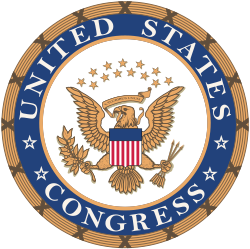United States Congress
bicameral legislature of the United States From Wikipedia, the free encyclopedia
The United States Congress is the legislative, or law making, branch of the United States government. It meets in the United States Capitol.[2]
United States Congress | |
|---|---|
| 119th Congress | |
 | |
| Type | |
| Type | |
| Houses | Senate House of Representatives |
| History | |
| Founded | March 4, 1789 |
| Preceded by | Congress of the Confederation |
New session started | January 3, 2025 |
| Leadership | |
| Structure | |
| Seats |
|
 | |
Senate political groups | Majority (53)
Minority (47)
|
 | |
House of Representatives political groups | Majority (218)
Minority (215)
Vacant (2)
|
| Elections | |
Senate last election | November 5, 2024 |
House of Representatives last election | November 5, 2024 |
Senate next election | November 3, 2030 |
House of Representatives next election | November 3, 2026 |
| Meeting place | |
 | |
| United States Capitol Washington, D.C. United States of America | |
| Website | |
| congress | |
| Constitution | |
| United States Constitution, Article I | |
It has two houses (parts): The United States House of Representatives and the United States Senate. This two house system is known as a bicameral (bi is the Latin word for "two", and camera is Latin for "chamber" or "room") legislature. There are 435 Representatives in Congress,[3] split between the states based on how many people live in the state.[4] There are 100 Senators in Congress, with two coming from each state.[5][6]
The primary duty of Congress is to write, debate, and pass bills (laws they want). For Congress to pass a bill, both houses must pass exactly the same bill. For each house to pass a bill, more than half of its members must vote in favor of passing the bill. After both houses pass the same bill, this bill is then sent to the President. If the President agrees the bill should be a law he or she signs the bill within 10 days. If the president does not agree, then he or she can veto the bill and send it back to Congress. If the bill is neither signed nor vetoed by the president within 10 days, the bill becomes law anyway if Congress does not adjourn (end its session) within that time. If Congress adjourns within that time, the bill does not become a law. Congress may override a president's veto of a bill by having more than two thirds of its members passing the bill. In that case, the bill becomes law even though the president vetoed it.
Article 1 of the United States Constitution lists what subjects Congress can pass laws on.
Members of Congress cannot be arrested, except for certain crimes, during a session of Congress or going to or returning from a session.
Each house of Congress can decide to expel (throw out) one of its members if more than two thirds of them vote to expel him or her.
The political party with the most members in a house of Congress usually decides which bills are voted on in their house.
Related page
References
Wikiwand - on
Seamless Wikipedia browsing. On steroids.
